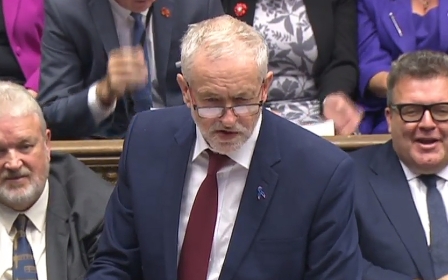Redefining anti-Semitism will not silence Palestinians' struggle for justice

I would not be writing this column in this way if the UK Parliament’s home affairs select committee had not dragged my homeland, Palestine, into the controversy surrounding anti-Semitism in this country through its decision this month to redefine the term.
Britain, which made the Balfour Declaration to the Zionists in 1917, has through the findings of this report, given the right to Zionists to silence Palestinians and their supporters in 2016.
We stand with our fellow Jewish British citizens to eradicate the specific form of racism which targets them and with fellow Palestinians as they seek a just solution to our collective predicament
It may surprise some people to read this, but that is exactly what happened when the select committee decided to bring Israel, which exists in historic Palestine, into its proposed revised definition of anti-Semitism.
The very fact that the committee brought the state of Israel into the discussion on anti-Semitism was in my view misguided and a disservice to the Jewish community in this country.
The committee decided that it should "aim to establish a definition which achieves an appropriate balance between condemning anti-Semitism vehemently, in all its forms, and maintaining freedom of speech - particularly in relation to legitimate criticism of the government of Israel”.
However, once criticism of Israel is linked to hatred of Jews in the UK, a line was crossed which implicitly makes the Jewish community somehow responsible for the actions of a foreign state. Previously established definitions of anti-Semitism did not make such a connection.
Just like in 1917, our voice as British Palestinians has neither been sought nor heard, while the voice of the Jewish community was sought and heard by members of Parliament. If anyone had asked, we would have told them that we have a clear view on racism and anti-Semitism which, unlike the views of some contributors who offered evidence, is not marred by support for a foreign state.
This includes representatives of Friends of Israel groups in the main political parties and several groups which claim to speak on behalf of the Jewish community, but are part of the pro-Israel lobby, including the Board of Deputies of British Jews and the Jewish Leadership Council.
Just like in 1917, our voice as British Palestinians has neither been sought nor heard, while the voice of the Jewish community was sought and heard by members of Parliament
It is telling that the chair of Conservative Friends of Israel, Eric Pickles, a former Conservative Party chairman, is listed as UK special envoy for post-Holocaust issues. Pickles told the committee: “The old stereotype of Jews owning everything, how they look and how they dress, that is completely unacceptable, but a kind of new anti-Semitism has crept in through this back-door, through anti-Zionism. Things that people say about Israelis or Zionists if they said about Jews would be clearly seen as being anti-Semitic”.
The Chief Rabbi himself suggested that “Zionism has been an integral part of Judaism from the dawn of our faith” when in fact it was developed in the 19th century.
Palestinians oppose anti-Semitism
As I wrote earlier this year, when the controversy surrounding alleged anti-Semitism in the British Labour party broke, we British Palestinians said we wanted to see anti-Semitism eradicated and also want sanctions imposed on Israel for its crimes against us. We stand with our fellow Jewish British citizens in their fight to eradicate the specific form of racism that affects them, which targets them, and we stand with fellow Palestinians in our homeland as they seek a just solution to our collective predicament.
I have always understood what is meant by racism and the specific form that targets Jews which is anti-Semitism. The definition of anti-Semitism which I grew up knowing is “the hatred of Jews because they are Jews”. This can and does apply to whichever country one lives in, including the Arab world, and should apply in a future independent Palestine.
If Jews are targeted because they are Jews then that is anti-Semitism. There is no need to qualify this or to renew it every few years for political motives. I can already hear cries that I have no right to define anti-Semitism for Jews. However, the cries will come from those who had no right to take or support the taking of my homeland.
If Jews are targeted because they are Jews then that is anti-Semitism. There is no need to qualify this or to renew it every few years for political motives.
In recent years, there has been a move to qualify and even redefine the term in light of the creation of Israel as a result of the development of a political ideology, Zionism, in the 19th century.
Various definitions of Zionism exist, but as far as Palestinians are concerned, the ideology revolved around the creation of a political entity for Jews in our homeland, historic Palestine, without our permission because they thought it would solve their problem. The fact that it was and continues to be a catastrophe for us is a minor inconvenience.
Bizarrely, Zionists claim that they have an eternal right to exclusively populate a specific plot of land and the world must accept this claim without question, they are simply "returning". I say bizarrely because Christians do not argue that they have an eternal right to the birthplace of their religion, Palestine, nor do all Muslims claim an eternal right to the birthplace of their religion, Mecca and Medina.
Christians do not argue that they have an eternal right to the birthplace of their religion, Palestine, nor do all Muslims claim an eternal right to the birthplace of their religion, Mecca and Medina.
Even more bizarrely, the claimants to my homeland were not living in it when they made their claim; my people, the Palestinians were. And, just as Jews, Christians and Muslims inhabited Palestine as a people, they also did so in Iraq, Syria, Egypt and Yemen, to name but a few Arab countries where Jews lived alongside Muslims. Palestine was not an empty land as Zionists claimed.
Had Israel not been forced onto Palestine, an independent Palestine would have probably emerged in which Christians, Jews and Muslims became citizens of that new Palestinian nation as would have been the case in Syria and Iraq, for example. It was the forced creation of Israel that created a catastrophe for Palestinians (the Nakba) and turmoil in the Middle East, which resulted in most Jews leaving their Arab homelands for the newly established Israel.
'Model occupied people'
We Palestinians are told that we must accept Israel as a reality, that we must not question its right to exist. But those who ask this of us would not have accepted the creation of a Zionist entity in their homeland. As I argued in a letter I wrote back in May, the Welsh people would not have accepted the creation of Israel in their homeland if Balfour had promised Wales to the Zionists.
Not only are Palestinians asked to accept Israel, we are expected to behave as a "model occupied people" while it decides what to do with us. The so-called "international community" has thus far failed to pressure Israel to agree to the most painful concession a people could give, to accept the existence of a foreign state on nearly 80 percent of our historic homeland. Israel wants more.
Israel’s education minister has recently made an explicit call for the annexation of the West Bank, to get even closer to achieving the dream of Zionism: Israel from the "river to the sea". As Western governments have failed us, we Palestinians have turned to ordinary citizens to support us and they have.
Not only are Palestinians asked to accept Israel, we are expected to behave as a "model occupied people" while it decides what to do with us.
Our call for a campaign to pressure Israel through Boycott, Divestment and Sanctions (BDS), a peaceful campaign, has been gathering momentum. It is hurting Israel which has decided to fight it rather than come to its senses and meet its legitimate demands.
Israel has dedicated significant resource to this fight but has also called on its supporters in other countries to fight it too. The UK government has regularly expressed opposition to BDS and the current foreign secretary was caught in a controversy about it when he visited Palestine and Israel as London's mayor last November.
Redefining anti-Semitism
In addition, some supporters of Zionism and apologists for Israel’s illegal practices have in recent years been attempting to qualify the established definition of anti-Semitism with the explicit intention of establishing a significant linkage between being a Jew and Israel. They have tried tirelessly to conflate Judaism, Zionism and Israel. If you are anti any of them, you should be labelled an anti-Semite.
They attempted to steer the recent debate on anti-Semitism in the UK’s Labour Party in this direction. When the inquiry into Baroness Chakrabarti did not find in their favour, they rubbished her report and turned their attention to the Home Affairs Select Committee on anti-Semitism.
Instead of rejecting the pro-Israel camp's desire to redefine anti-Semitism, the select committee took a discredited European Union definition, and then amended it to now include criticism of Israel as part of the term, but not always, resulting in a dog’s breakfast. The committee fell for the pro-Israel lobby’s desire for the conflation of anti-Zionism and anti-Semitism hook, line and sinker. Anti-Semitism was redefined and the supporters of Israel are cheering.
Criminalising dissent
We Palestinians are not cheering. We are entitled to be extremely concerned that our ability and that of our supporters to educate and campaign has been compromised through the deliberate attempt by supporters of Israel to abuse anti-Semitism for the purpose of taking the heat off the rogue state they support.
They not only want us to think twice about speaking out and criticising Israel, but they also want the government to move to criminalise us if we do and when they (whoever they are) judge that we have overstepped the mark.
It seems that from Balfour to anti-Semitism, Britain is determined to complete the Zionist colonisation of our homeland, Palestine.
It seems that from Balfour to anti-Semitism, Britain is determined to complete the Zionist colonisation of our homeland, Palestine.
Our message to British politicians is this: as long as Israel continues to occupy Palestine, to oppress and murder, to lay siege to two million people, to steal our land and resources, to restrict our movement, to refuse to allow the refugees to return, to attack our religious sites, to illegally settle our land and to leave our people with no hope of freedom, dignity or independence, we and our supporters will continue to speak out, to educate and to demand that the British government changes its shameful, but deliberate policies which place trade with Israel above human rights.
We will not allow Zionists who support a state that does all of the above to silence us under the disguise of the "new anti-Semitism" but we will continue to stand shoulder-to-shoulder with Jews in their fight against the real anti-Semitism that some still undoubtedly face.
As Palestinians, we demand the British government reject the select committee’s call to adopt its proposed definition of anti-Semitism.
- Kamel Hawwash is a British-Palestinian engineering professor based at the University of Birmingham and a longstanding campaigner for justice, especially for the Palestinian people. He is vice chair of the Palestine Solidarity Campaign (PSC) and appears regularly in the media as commentator on Middle East issues. He runs a blog at www.kamelhawwash.com. He writes here in a personal capacity.
The views expressed in this article belong to the author and do not necessarily reflect the editorial policy of Middle East Eye.
Photo: A London taxi drives by as Pro-Palestinian supporters position a giant banner calling for a recognised Palestinian State, in Parliament Square, central London on October 13, 2014. (AFP)
Middle East Eye propose une couverture et une analyse indépendantes et incomparables du Moyen-Orient, de l’Afrique du Nord et d’autres régions du monde. Pour en savoir plus sur la reprise de ce contenu et les frais qui s’appliquent, veuillez remplir ce formulaire [en anglais]. Pour en savoir plus sur MEE, cliquez ici [en anglais].





